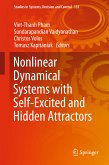Feedback equivalence to a passive system and resulting stabilization strategies are discussed. The passivity concepts are enriched by a generalised Hamiltonian formalism, emphasising the close relations with physical modeling and control by interconnection, and leading to novel control methodologies going beyond passivity.
The potential of L2-gain techniquesin nonlinear control, including a theory of all-pass factorizations of nonlinear systems, and of parametrization of stabilizing controllers, is demonstrated. The nonlinear H-infinity optimal control problem is also treated and the book concludes with a geometric analysis of the solution sets of Hamilton-Jacobi inequalities and their relation with Riccati inequalities for the linearization.
· L2-Gain and Passivity Techniques in Nonlinear Control (third edition) is thoroughly updated, revised, reorganized and expanded. Among the changes, readers will find:
· updated and extended coverage of dissipative systems theory
· substantial new material regarding converse passivity theorems and incremental/shifted passivity
<· coverage of recent developments on networks of passive systems with examples
· a completely overhauled and succinct introduction to modeling and control of port-Hamiltonian systems, followed by an exposition of port-Hamiltonian formulation of physical network dynamics
· updated treatment of all-pass factorization of nonlinear systems
The book provides graduate students and researchers in systems and control with a compact presentation of a fundamental and rapidly developing area of nonlinear control theory, illustrated by a broad range of relevant examples stemming from different application areas.
Dieser Download kann aus rechtlichen Gründen nur mit Rechnungsadresse in A, B, BG, CY, CZ, D, DK, EW, E, FIN, F, GR, HR, H, IRL, I, LT, L, LR, M, NL, PL, P, R, S, SLO, SK ausgeliefert werden.
"This text is sure to continue to be one of the go-to references for nonlinear control researchers and practitioners interested in both the classical and modern interpretations and applications of L2-gain and passivity methods for nonlinear systems." (James Richard Forbes, IEEE Control Systems Magazine, December, 2017)









